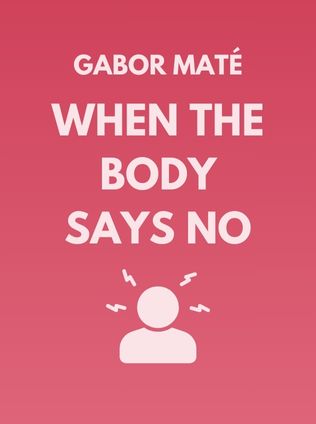
When the Body Says No
The Cost of Hidden Stress
By Gabor Maté
Published 01/2003
About the Author
Dr. Gabor Maté is a renowned physician, author, and speaker who has made significant contributions to our understanding of the mind-body connection, stress, and disease. With over 30 years of experience in clinical and hospital settings, Dr. Maté has developed a deep insight into the interplay between mental and physical health. His work spans multiple disciplines, including addiction, stress, trauma, and chronic illness, and he is widely recognized for his ability to articulate complex ideas in a way that is both accessible and profoundly impactful.
Born in Hungary in 1944, Dr. Maté's early experiences as a child during the Holocaust profoundly shaped his understanding of trauma and its long-lasting effects on both individuals and society. After moving to Canada, he pursued a career in medicine, where he began to see the connections between emotional and psychological stress and physical illness. His approach is deeply humanistic, advocating for a holistic understanding of health that considers the biological, psychological, social, and environmental factors that influence our well-being.
Dr. Maté is also the author of several other influential books, including "In the Realm of Hungry Ghosts," which explores addiction, and "Scattered Minds," which examines ADHD. His work has inspired countless individuals to look beyond the surface of their symptoms and understand the deeper causes of their suffering.
Main Idea
In "When the Body Says No," Dr. Gabor Maté explores the profound connection between chronic stress and disease. He argues that many of the illnesses we face today are the body's way of saying "no" to the relentless stress imposed by modern lifestyles. According to Maté, chronic stress—often subconscious and unrecognized—is a major contributor to a wide range of diseases, including cancer, autoimmune disorders, and digestive issues. He challenges the conventional medical approach that often treats the body and mind as separate entities, advocating instead for a biopsychosocial model that recognizes the inseparable connection between our emotions, our environment, and our physical health.
Dr. Maté emphasizes the importance of understanding and addressing the psychological and emotional roots of illness. He discusses how unresolved trauma, repressed emotions, and the pressures of living up to societal expectations can lead to chronic stress, which in turn manifests as physical disease. By exploring the mind-body relationship, Maté offers a new perspective on healing that encourages individuals to become more attuned to their emotions, embrace their authentic selves, and develop healthier ways of coping with stress.
Table of Contents
- The Mind-Body Connection
- The Impact of Chronic Stress
- The Role of Childhood Experiences
- Personality Traits and Disease
- The Biopsychosocial Approach
- Healing Through Emotional Competence
- Conclusion
The Mind-Body Connection
Dr. Gabor Maté delves into the historical and philosophical underpinnings of modern medicine, particularly the concept of mind-body dualism that has dominated Western medical thought for centuries. This dualistic approach, which treats the mind and body as separate entities, has led to a fragmented understanding of health. In contrast, Maté advocates for a holistic view that recognizes the deep interconnectedness between our emotional and physical well-being.
Drawing on the philosophy of René Descartes, whose ideas laid the groundwork for mind-body dualism, Maté explains how this perspective has shaped contemporary medical practice. While Descartes' ideas were revolutionary in challenging the religious dogma of his time, they also contributed to a narrow focus on the body as a machine, separate from the mind. This mechanistic view has persisted in modern medicine, leading to a tendency to treat symptoms in isolation, without considering the psychological and emotional factors that contribute to disease.
"There is no separation between mind and body… both are intricately connected and influence each other in profound ways." — Gabor Maté
Maté argues that this separation is artificial and that the mind and body are, in fact, part of a single, integrated system. He highlights the importance of understanding how our thoughts, emotions, and experiences can affect our physical health. For example, stress, which is often perceived and processed by the mind, triggers physiological responses in the body that can lead to illness if left unresolved.
He also draws attention to traditional healing systems, such as those practiced by indigenous cultures, which have always recognized the holistic nature of health. These systems view illness as a disturbance in the balance between mind, body, spirit, and environment, and they employ a wide range of therapies to restore harmony. In contrast, modern medicine's focus on physical symptoms often misses the underlying emotional and psychological causes of disease.
The Impact of Chronic Stress
One of the central themes of "When the Body Says No" is the devastating impact of chronic stress on our health. Maté distinguishes between acute stress, which is a temporary response to immediate threats, and chronic stress, which is a prolonged state of tension that can have far-reaching effects on the body.
Acute stress, Maté explains, is a natural and necessary response to danger. When we encounter a threat, our bodies activate the "fight or flight" response, releasing hormones like adrenaline and cortisol that prepare us to deal with the situation. Once the threat has passed, our bodies return to a state of equilibrium, and the stress response subsides.
Sign up for FREE and get access to 1,400+ books summaries.
You May Also Like
The Subtle Art of Not Giving a F*ck
A Counterintuitive Approach to Living a Good Life
By Mark MansonRich Dad Poor Dad
What the Rich Teach Their Kids About Money - That the Poor and Middle Class Do Not!
By Robert T. KiyosakiHow To Win Friends and Influence People
The All-Time Classic Manual Of People Skills
By Dale CarnegieFreakonomics
A Rogue Economist Explores the Hidden Side of Everything
By Steven D. Levitt and Stephen J. Dubner



















